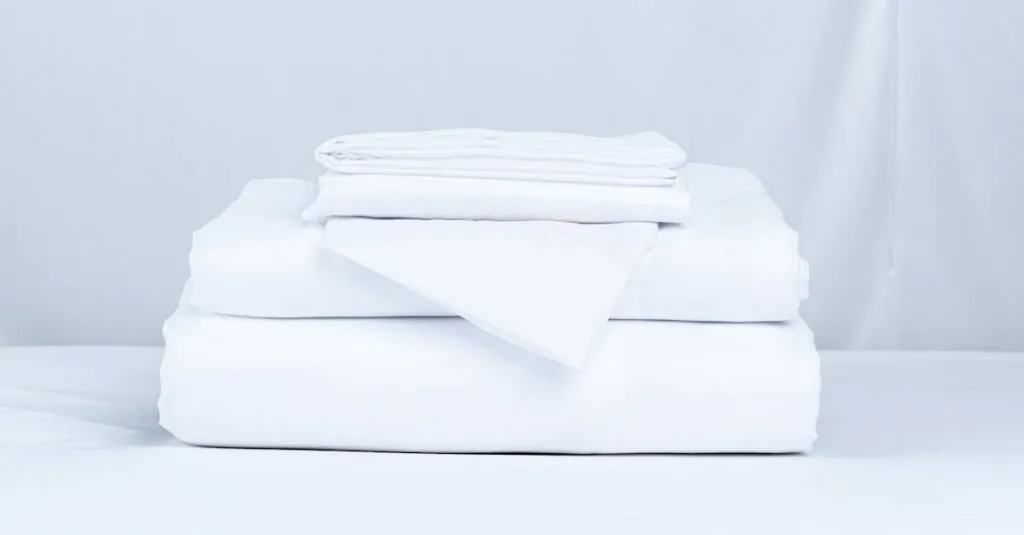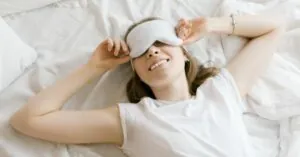Table of Contents
ToggleIn a world where sleep seems to be as elusive as a unicorn, the quest for better rest can feel like a never-ending saga. Enter the sleep hygiene therapist aid, a game-changer in the battle against restless nights. This trusty sidekick doesn’t just preach about counting sheep; it offers practical strategies that make sleep feel like a cozy hug instead of a wrestling match with insomnia.
Overview Of Sleep Hygiene
Sleep hygiene refers to a series of practices that promote consistent and restorative sleep. It encompasses various behavioral and environmental factors that can significantly affect sleep quality. Maintaining a sleep-friendly environment helps facilitate relaxation before bedtime.
Creating a comfortable sleep area is essential. Dark, quiet, and cool environments encourage deeper sleep. Additionally, keeping electronics out of the bedroom aids in minimizing distractions.
Adhering to a regular sleep schedule also proves beneficial. Going to bed and waking up at the same time daily helps regulate the body’s internal clock. This consistency enables easier falling asleep and rising.
Engaging in relaxing activities before bed enhances sleep readiness. Practices like reading, meditating, or gentle yoga can markedly reduce anxiety levels. Light exposure is important as well; minimizing blue light from screens in the evening supports the natural melatonin production process.
Diet and exercise play significant roles in sleep hygiene too. Reducing caffeine and heavy meals close to bedtime supports better sleep. Regular physical activity, particularly earlier in the day, promotes quicker sleep onset and improved rest.
Understanding individual sleep needs also aids in tailoring an effective sleep hygiene routine. People vary in their optimal sleep duration and quality preferences. Therefore, a personalized approach fosters better outcomes.
By prioritizing these aspects, individuals can enhance their sleep hygiene and overall health. Establishing a thorough sleep hygiene plan enables an individual to tackle insomnia effectively.
Importance Of Sleep Hygiene
Maintaining good sleep hygiene plays a crucial role in promoting overall health and well-being. Individuals who organize their sleep practices often experience better sleep quality and enhanced daily functioning.
Benefits Of Good Sleep Hygiene
Good sleep hygiene offers multiple health benefits. Improved mood frequently accompanies better sleep, contributing to emotional stability. Enhanced cognitive performance results from adequate rest, leading to better focus and decision-making. Increased energy levels provide motivation for daily tasks, encouraging physical activity and productivity. Consistently adequate sleep strengthens the immune system, reducing the likelihood of illness. Establishing a routine helps regulate the body’s internal clock, making it easier to fall asleep and wake up naturally. These practices, when prioritized, facilitate a more restful and restorative sleep experience.
Impacts Of Poor Sleep Hygiene
Poor sleep hygiene can significantly affect various aspects of life. Increased levels of stress often arise from inadequate sleep, leading to decreased emotional resilience. Cognitive impairment is common when sleep quality declines, resulting in forgetfulness and decreased concentration. Health risks, such as obesity and cardiovascular disease, grow as sleep deprivation influences metabolism and blood pressure. Chronic fatigue tends to affect motivation and daily performance, reducing overall productivity. Disruptions in sleep patterns can contribute to mental health issues, including anxiety and depression. Addressing these negative impacts through effective sleep hygiene practices can improve overall well-being.
Role Of A Sleep Hygiene Therapist Aid
A sleep hygiene therapist aid plays a vital role in promoting effective sleep strategies. This aid provides tailored techniques to enhance sleep quality and overall well-being.
What Is A Sleep Hygiene Therapist Aid?
A sleep hygiene therapist aid offers guidance on creating and maintaining healthy sleep practices. It includes resources such as worksheets, sleep diaries, and checklists designed to help individuals assess their habits and make necessary adjustments. Professionals often incorporate these tools into therapy sessions, ensuring clients stay focused on improving sleep routines. Understanding personal sleep requirements is central to its effectiveness.
How A Therapist Aid Enhances Sleep Hygiene
A therapist aid enhances sleep hygiene by promoting individualized strategies. It encourages clients to identify triggers affecting their sleep and implement proven techniques for change. Engaging with an aid provides accountability, facilitating consistency in sleep practices. Additionally, it helps individuals track their progress over time, leading to more effective adjustments. By fostering a supportive environment, the aid empowers users to prioritize their sleep health and achieve lasting benefits.
Techniques And Strategies
Effective sleep hygiene practices rely on a variety of techniques and strategies. Sleep hygiene therapist aids utilize specific methods to address sleep-related challenges and improve overall sleep quality.
Common Techniques Used By Therapist Aids
Therapist aids often implement cognitive behavioral therapy for insomnia (CBT-I). This method addresses negative thoughts and behaviors affecting sleep. Sleep restriction therapy limits the time spent in bed to improve sleep efficiency. Stimulus control therapy encourages clients to associate the bedroom with sleep, fostering a mental connection. Relaxation techniques like deep breathing and progressive muscle relaxation help reduce anxiety before sleep. Many therapists recommend maintaining a consistent sleep schedule, as regularity supports the body’s natural circadian rhythm.
Personalizing Sleep Hygiene Plans
Adapting sleep hygiene plans to individual needs enhances effectiveness. Therapists assess specific sleep patterns and lifestyles to create custom strategies. Tracking habits through sleep diaries allows for identifying trends and triggers impacting sleep quality. Recommendations can include dietary modifications, like avoiding caffeine and heavy meals before bedtime. Introducing calming pre-sleep activities, such as reading or light stretching, can support relaxation. Personalized approaches ultimately foster accountability and commitment to improving overall sleep habits.
Embracing effective sleep hygiene practices is essential for achieving restorative sleep and enhancing overall well-being. A sleep hygiene therapist aid serves as a powerful resource in this journey, offering personalized strategies and tools that empower individuals to tackle their unique sleep challenges. By fostering accountability and providing tailored guidance, these aids can significantly improve sleep quality and daily functioning.
The journey to better sleep doesn’t have to be daunting. With the right support and commitment to healthy sleep habits, anyone can enjoy the numerous benefits of good sleep hygiene, leading to improved mood, cognitive performance, and overall health. Prioritizing sleep is not just a luxury; it’s a vital component of a healthy lifestyle.







